Taxation Law - Report: Letter of Advice and Reflective Writing
VerifiedAdded on 2023/01/06
|15
|3481
|25
Report
AI Summary
This report is a comprehensive analysis of taxation law, structured as a letter of advice to a client, Olivia Patterson, and includes reflective writing. The letter addresses several tax-related matters based on the client's financial activities, including employment income, fringe benefits, and investment properties. It provides detailed guidance on the tax implications of salary, superannuation contributions, discounts, reimbursements, and work-related items. The report further examines the tax treatment of investment properties, including allowable deductions for rental expenses, and the non-deductibility of certain capital expenses. It also covers the tax implications of transferring funds and shares, emphasizing the importance of declaring interest income and the possibility of gifting shares without incurring capital gains tax. The reflective writing section likely offers the student's personal insights and understanding of the concepts and their application.
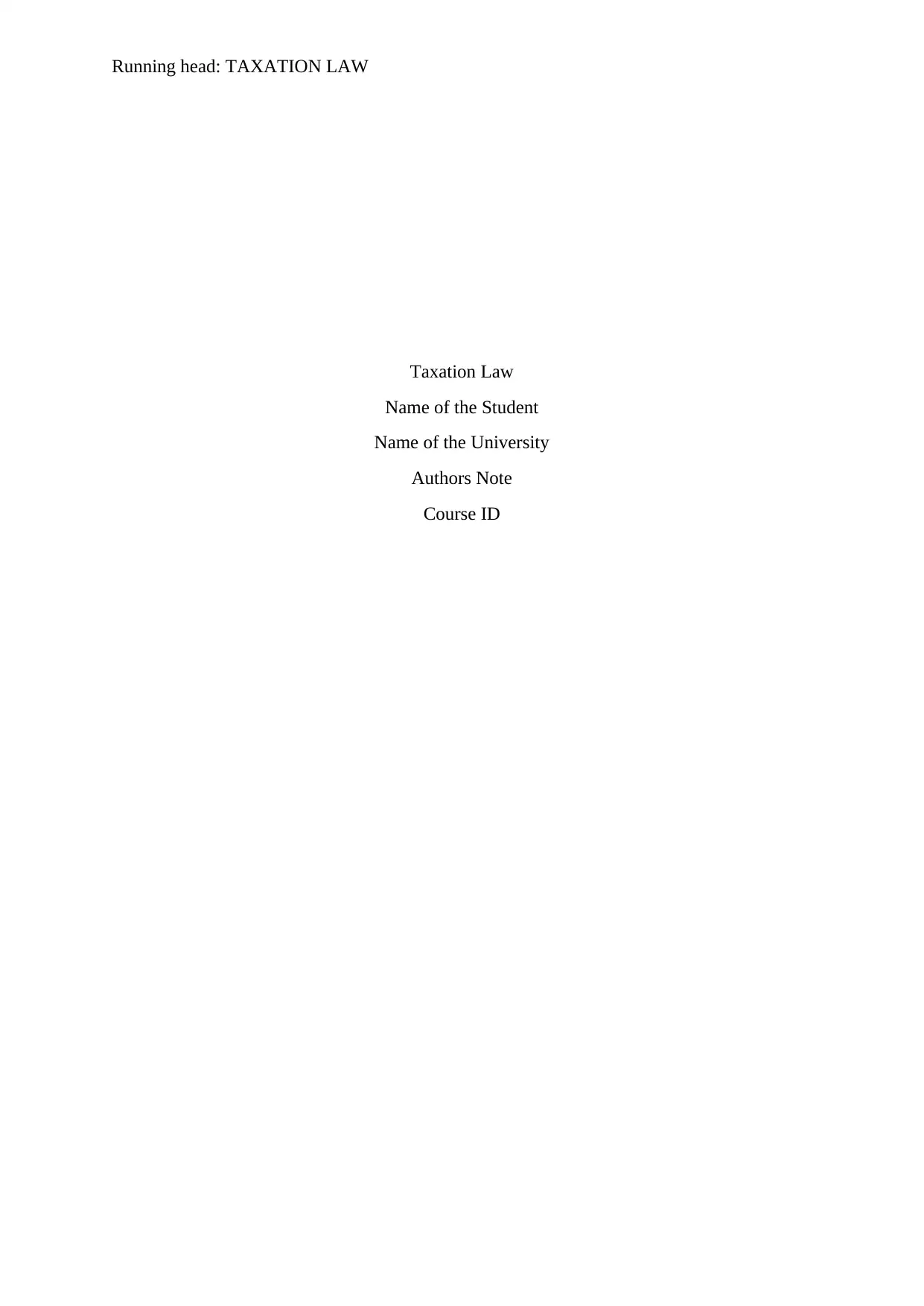
Running head: TAXATION LAW
Taxation Law
Name of the Student
Name of the University
Authors Note
Course ID
Taxation Law
Name of the Student
Name of the University
Authors Note
Course ID
Paraphrase This Document
Need a fresh take? Get an instant paraphrase of this document with our AI Paraphraser
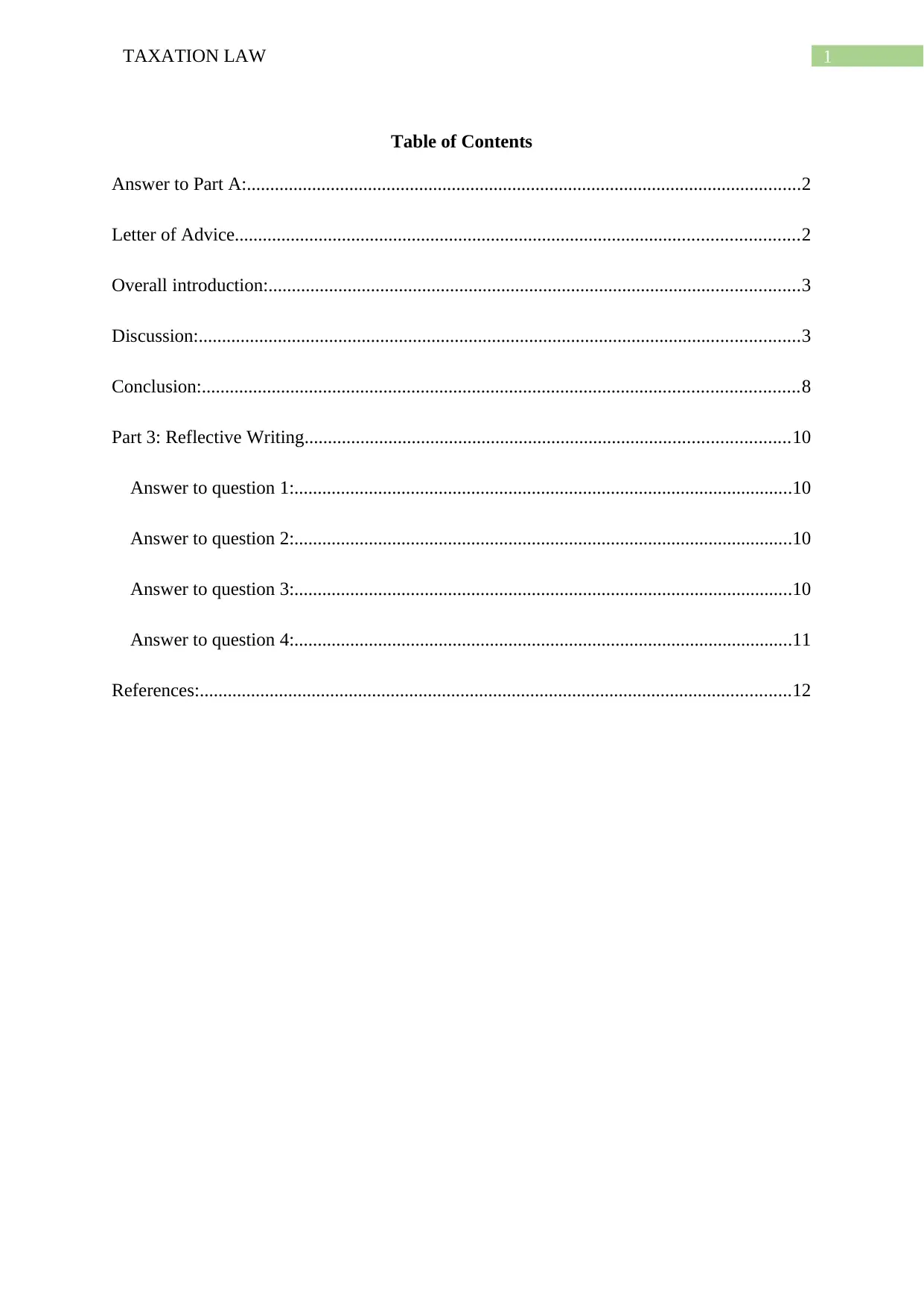
1TAXATION LAW
Table of Contents
Answer to Part A:.......................................................................................................................2
Letter of Advice.........................................................................................................................2
Overall introduction:..................................................................................................................3
Discussion:.................................................................................................................................3
Conclusion:................................................................................................................................8
Part 3: Reflective Writing........................................................................................................10
Answer to question 1:...........................................................................................................10
Answer to question 2:...........................................................................................................10
Answer to question 3:...........................................................................................................10
Answer to question 4:...........................................................................................................11
References:...............................................................................................................................12
Table of Contents
Answer to Part A:.......................................................................................................................2
Letter of Advice.........................................................................................................................2
Overall introduction:..................................................................................................................3
Discussion:.................................................................................................................................3
Conclusion:................................................................................................................................8
Part 3: Reflective Writing........................................................................................................10
Answer to question 1:...........................................................................................................10
Answer to question 2:...........................................................................................................10
Answer to question 3:...........................................................................................................10
Answer to question 4:...........................................................................................................11
References:...............................................................................................................................12
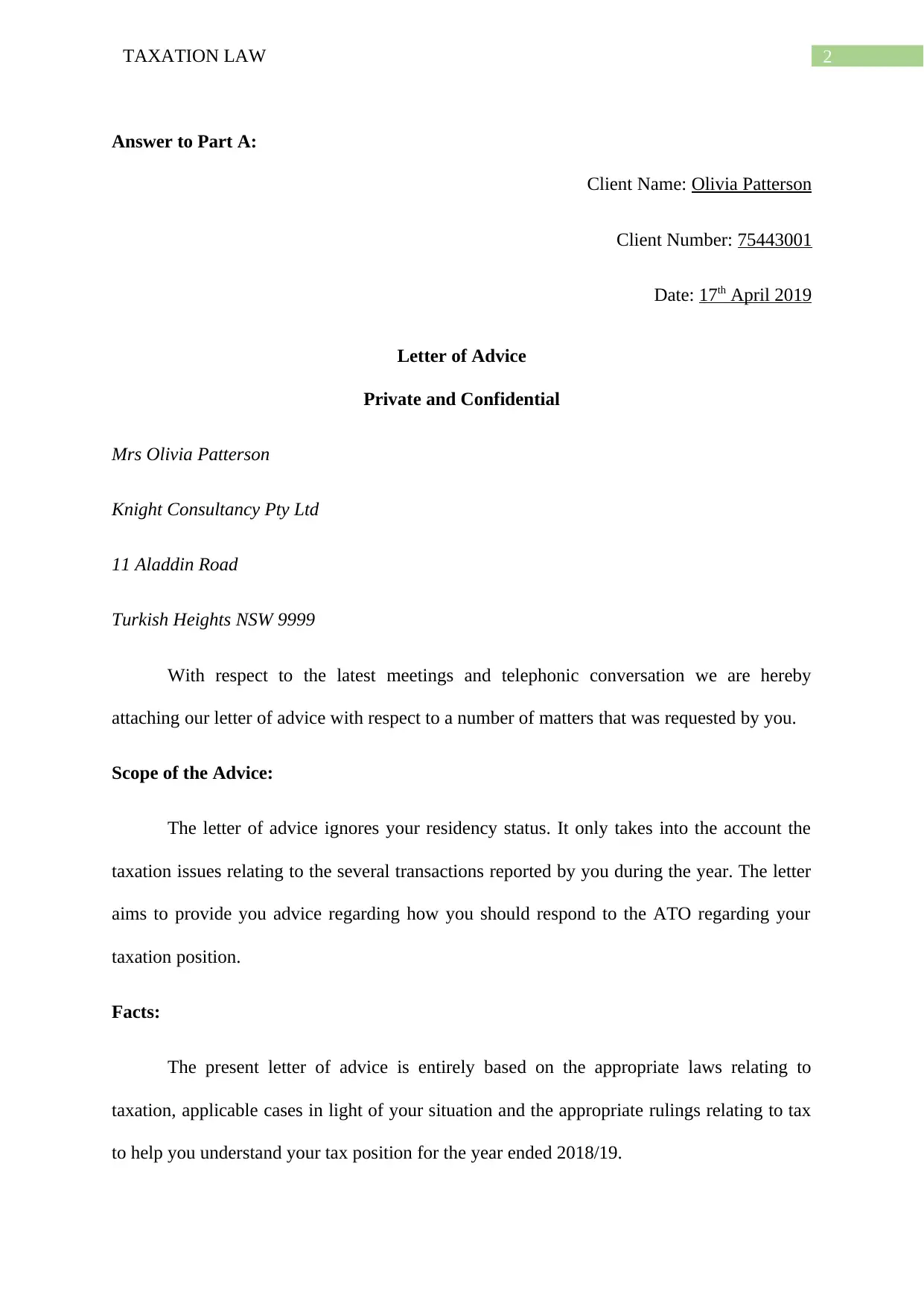
2TAXATION LAW
Answer to Part A:
Client Name: Olivia Patterson
Client Number: 75443001
Date: 17th April 2019
Letter of Advice
Private and Confidential
Mrs Olivia Patterson
Knight Consultancy Pty Ltd
11 Aladdin Road
Turkish Heights NSW 9999
With respect to the latest meetings and telephonic conversation we are hereby
attaching our letter of advice with respect to a number of matters that was requested by you.
Scope of the Advice:
The letter of advice ignores your residency status. It only takes into the account the
taxation issues relating to the several transactions reported by you during the year. The letter
aims to provide you advice regarding how you should respond to the ATO regarding your
taxation position.
Facts:
The present letter of advice is entirely based on the appropriate laws relating to
taxation, applicable cases in light of your situation and the appropriate rulings relating to tax
to help you understand your tax position for the year ended 2018/19.
Answer to Part A:
Client Name: Olivia Patterson
Client Number: 75443001
Date: 17th April 2019
Letter of Advice
Private and Confidential
Mrs Olivia Patterson
Knight Consultancy Pty Ltd
11 Aladdin Road
Turkish Heights NSW 9999
With respect to the latest meetings and telephonic conversation we are hereby
attaching our letter of advice with respect to a number of matters that was requested by you.
Scope of the Advice:
The letter of advice ignores your residency status. It only takes into the account the
taxation issues relating to the several transactions reported by you during the year. The letter
aims to provide you advice regarding how you should respond to the ATO regarding your
taxation position.
Facts:
The present letter of advice is entirely based on the appropriate laws relating to
taxation, applicable cases in light of your situation and the appropriate rulings relating to tax
to help you understand your tax position for the year ended 2018/19.
⊘ This is a preview!⊘
Do you want full access?
Subscribe today to unlock all pages.

Trusted by 1+ million students worldwide
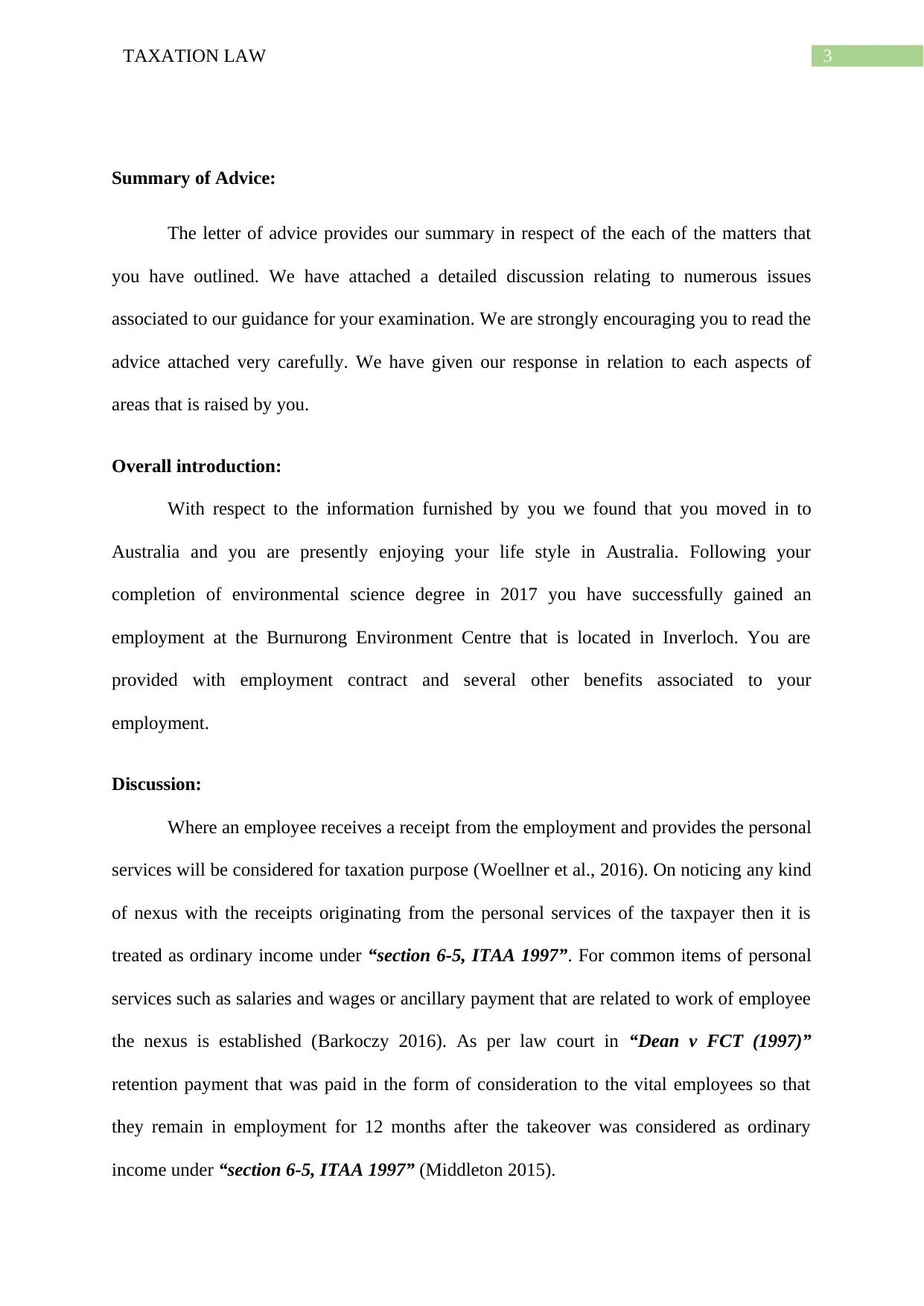
3TAXATION LAW
Summary of Advice:
The letter of advice provides our summary in respect of the each of the matters that
you have outlined. We have attached a detailed discussion relating to numerous issues
associated to our guidance for your examination. We are strongly encouraging you to read the
advice attached very carefully. We have given our response in relation to each aspects of
areas that is raised by you.
Overall introduction:
With respect to the information furnished by you we found that you moved in to
Australia and you are presently enjoying your life style in Australia. Following your
completion of environmental science degree in 2017 you have successfully gained an
employment at the Burnurong Environment Centre that is located in Inverloch. You are
provided with employment contract and several other benefits associated to your
employment.
Discussion:
Where an employee receives a receipt from the employment and provides the personal
services will be considered for taxation purpose (Woellner et al., 2016). On noticing any kind
of nexus with the receipts originating from the personal services of the taxpayer then it is
treated as ordinary income under “section 6-5, ITAA 1997”. For common items of personal
services such as salaries and wages or ancillary payment that are related to work of employee
the nexus is established (Barkoczy 2016). As per law court in “Dean v FCT (1997)”
retention payment that was paid in the form of consideration to the vital employees so that
they remain in employment for 12 months after the takeover was considered as ordinary
income under “section 6-5, ITAA 1997” (Middleton 2015).
Summary of Advice:
The letter of advice provides our summary in respect of the each of the matters that
you have outlined. We have attached a detailed discussion relating to numerous issues
associated to our guidance for your examination. We are strongly encouraging you to read the
advice attached very carefully. We have given our response in relation to each aspects of
areas that is raised by you.
Overall introduction:
With respect to the information furnished by you we found that you moved in to
Australia and you are presently enjoying your life style in Australia. Following your
completion of environmental science degree in 2017 you have successfully gained an
employment at the Burnurong Environment Centre that is located in Inverloch. You are
provided with employment contract and several other benefits associated to your
employment.
Discussion:
Where an employee receives a receipt from the employment and provides the personal
services will be considered for taxation purpose (Woellner et al., 2016). On noticing any kind
of nexus with the receipts originating from the personal services of the taxpayer then it is
treated as ordinary income under “section 6-5, ITAA 1997”. For common items of personal
services such as salaries and wages or ancillary payment that are related to work of employee
the nexus is established (Barkoczy 2016). As per law court in “Dean v FCT (1997)”
retention payment that was paid in the form of consideration to the vital employees so that
they remain in employment for 12 months after the takeover was considered as ordinary
income under “section 6-5, ITAA 1997” (Middleton 2015).
Paraphrase This Document
Need a fresh take? Get an instant paraphrase of this document with our AI Paraphraser
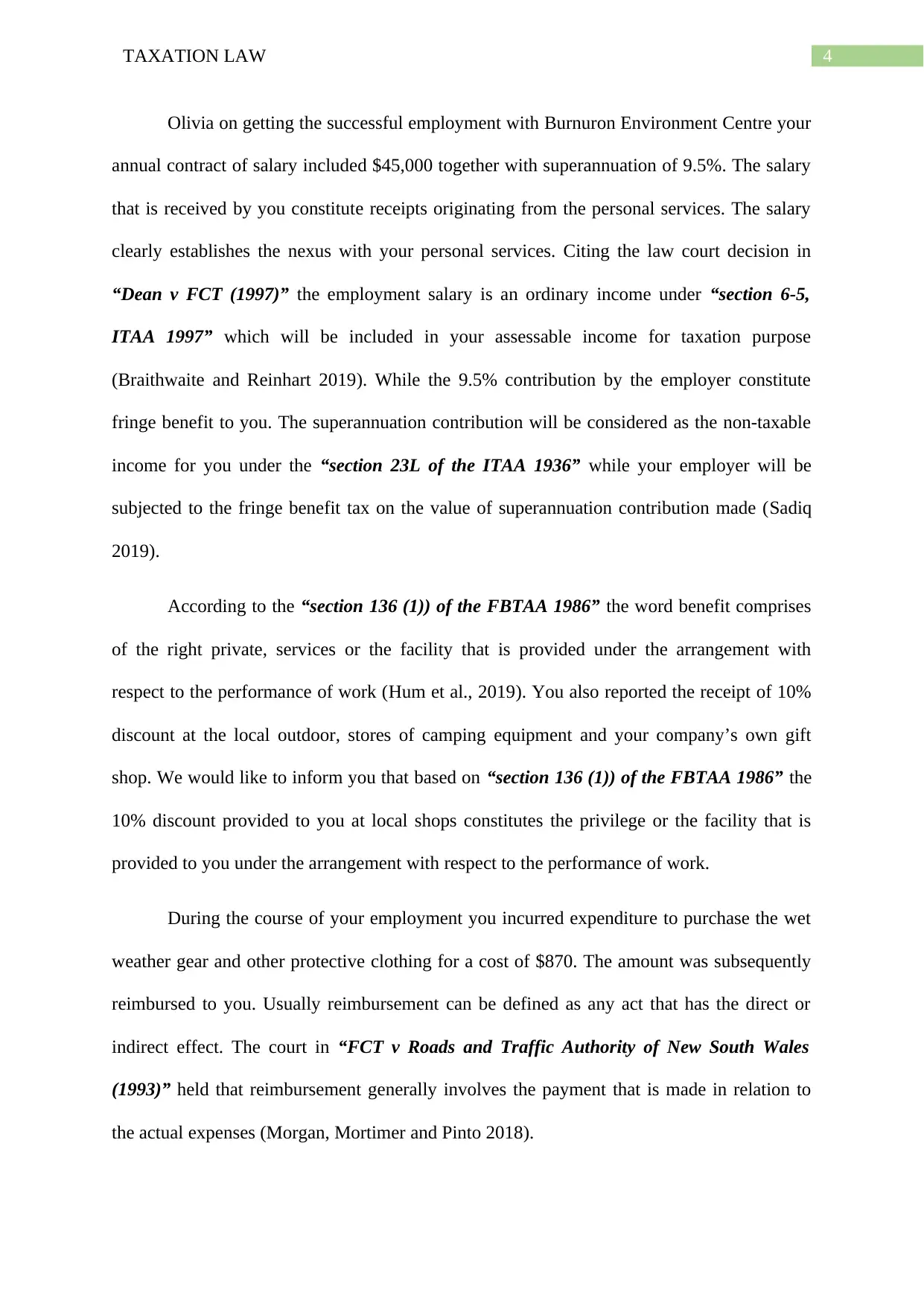
4TAXATION LAW
Olivia on getting the successful employment with Burnuron Environment Centre your
annual contract of salary included $45,000 together with superannuation of 9.5%. The salary
that is received by you constitute receipts originating from the personal services. The salary
clearly establishes the nexus with your personal services. Citing the law court decision in
“Dean v FCT (1997)” the employment salary is an ordinary income under “section 6-5,
ITAA 1997” which will be included in your assessable income for taxation purpose
(Braithwaite and Reinhart 2019). While the 9.5% contribution by the employer constitute
fringe benefit to you. The superannuation contribution will be considered as the non-taxable
income for you under the “section 23L of the ITAA 1936” while your employer will be
subjected to the fringe benefit tax on the value of superannuation contribution made (Sadiq
2019).
According to the “section 136 (1)) of the FBTAA 1986” the word benefit comprises
of the right private, services or the facility that is provided under the arrangement with
respect to the performance of work (Hum et al., 2019). You also reported the receipt of 10%
discount at the local outdoor, stores of camping equipment and your company’s own gift
shop. We would like to inform you that based on “section 136 (1)) of the FBTAA 1986” the
10% discount provided to you at local shops constitutes the privilege or the facility that is
provided to you under the arrangement with respect to the performance of work.
During the course of your employment you incurred expenditure to purchase the wet
weather gear and other protective clothing for a cost of $870. The amount was subsequently
reimbursed to you. Usually reimbursement can be defined as any act that has the direct or
indirect effect. The court in “FCT v Roads and Traffic Authority of New South Wales
(1993)” held that reimbursement generally involves the payment that is made in relation to
the actual expenses (Morgan, Mortimer and Pinto 2018).
Olivia on getting the successful employment with Burnuron Environment Centre your
annual contract of salary included $45,000 together with superannuation of 9.5%. The salary
that is received by you constitute receipts originating from the personal services. The salary
clearly establishes the nexus with your personal services. Citing the law court decision in
“Dean v FCT (1997)” the employment salary is an ordinary income under “section 6-5,
ITAA 1997” which will be included in your assessable income for taxation purpose
(Braithwaite and Reinhart 2019). While the 9.5% contribution by the employer constitute
fringe benefit to you. The superannuation contribution will be considered as the non-taxable
income for you under the “section 23L of the ITAA 1936” while your employer will be
subjected to the fringe benefit tax on the value of superannuation contribution made (Sadiq
2019).
According to the “section 136 (1)) of the FBTAA 1986” the word benefit comprises
of the right private, services or the facility that is provided under the arrangement with
respect to the performance of work (Hum et al., 2019). You also reported the receipt of 10%
discount at the local outdoor, stores of camping equipment and your company’s own gift
shop. We would like to inform you that based on “section 136 (1)) of the FBTAA 1986” the
10% discount provided to you at local shops constitutes the privilege or the facility that is
provided to you under the arrangement with respect to the performance of work.
During the course of your employment you incurred expenditure to purchase the wet
weather gear and other protective clothing for a cost of $870. The amount was subsequently
reimbursed to you. Usually reimbursement can be defined as any act that has the direct or
indirect effect. The court in “FCT v Roads and Traffic Authority of New South Wales
(1993)” held that reimbursement generally involves the payment that is made in relation to
the actual expenses (Morgan, Mortimer and Pinto 2018).
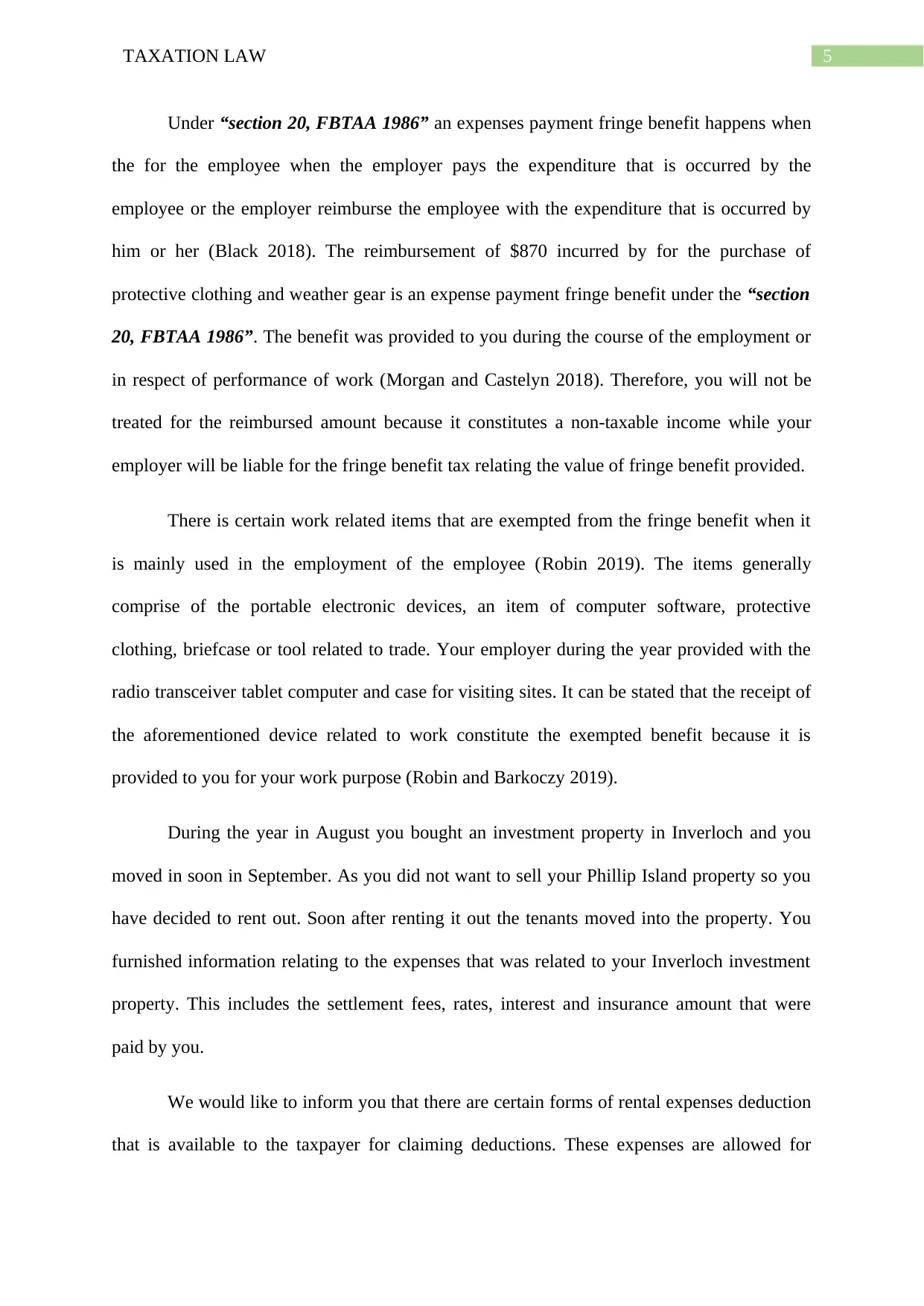
5TAXATION LAW
Under “section 20, FBTAA 1986” an expenses payment fringe benefit happens when
the for the employee when the employer pays the expenditure that is occurred by the
employee or the employer reimburse the employee with the expenditure that is occurred by
him or her (Black 2018). The reimbursement of $870 incurred by for the purchase of
protective clothing and weather gear is an expense payment fringe benefit under the “section
20, FBTAA 1986”. The benefit was provided to you during the course of the employment or
in respect of performance of work (Morgan and Castelyn 2018). Therefore, you will not be
treated for the reimbursed amount because it constitutes a non-taxable income while your
employer will be liable for the fringe benefit tax relating the value of fringe benefit provided.
There is certain work related items that are exempted from the fringe benefit when it
is mainly used in the employment of the employee (Robin 2019). The items generally
comprise of the portable electronic devices, an item of computer software, protective
clothing, briefcase or tool related to trade. Your employer during the year provided with the
radio transceiver tablet computer and case for visiting sites. It can be stated that the receipt of
the aforementioned device related to work constitute the exempted benefit because it is
provided to you for your work purpose (Robin and Barkoczy 2019).
During the year in August you bought an investment property in Inverloch and you
moved in soon in September. As you did not want to sell your Phillip Island property so you
have decided to rent out. Soon after renting it out the tenants moved into the property. You
furnished information relating to the expenses that was related to your Inverloch investment
property. This includes the settlement fees, rates, interest and insurance amount that were
paid by you.
We would like to inform you that there are certain forms of rental expenses deduction
that is available to the taxpayer for claiming deductions. These expenses are allowed for
Under “section 20, FBTAA 1986” an expenses payment fringe benefit happens when
the for the employee when the employer pays the expenditure that is occurred by the
employee or the employer reimburse the employee with the expenditure that is occurred by
him or her (Black 2018). The reimbursement of $870 incurred by for the purchase of
protective clothing and weather gear is an expense payment fringe benefit under the “section
20, FBTAA 1986”. The benefit was provided to you during the course of the employment or
in respect of performance of work (Morgan and Castelyn 2018). Therefore, you will not be
treated for the reimbursed amount because it constitutes a non-taxable income while your
employer will be liable for the fringe benefit tax relating the value of fringe benefit provided.
There is certain work related items that are exempted from the fringe benefit when it
is mainly used in the employment of the employee (Robin 2019). The items generally
comprise of the portable electronic devices, an item of computer software, protective
clothing, briefcase or tool related to trade. Your employer during the year provided with the
radio transceiver tablet computer and case for visiting sites. It can be stated that the receipt of
the aforementioned device related to work constitute the exempted benefit because it is
provided to you for your work purpose (Robin and Barkoczy 2019).
During the year in August you bought an investment property in Inverloch and you
moved in soon in September. As you did not want to sell your Phillip Island property so you
have decided to rent out. Soon after renting it out the tenants moved into the property. You
furnished information relating to the expenses that was related to your Inverloch investment
property. This includes the settlement fees, rates, interest and insurance amount that were
paid by you.
We would like to inform you that there are certain forms of rental expenses deduction
that is available to the taxpayer for claiming deductions. These expenses are allowed for
⊘ This is a preview!⊘
Do you want full access?
Subscribe today to unlock all pages.

Trusted by 1+ million students worldwide
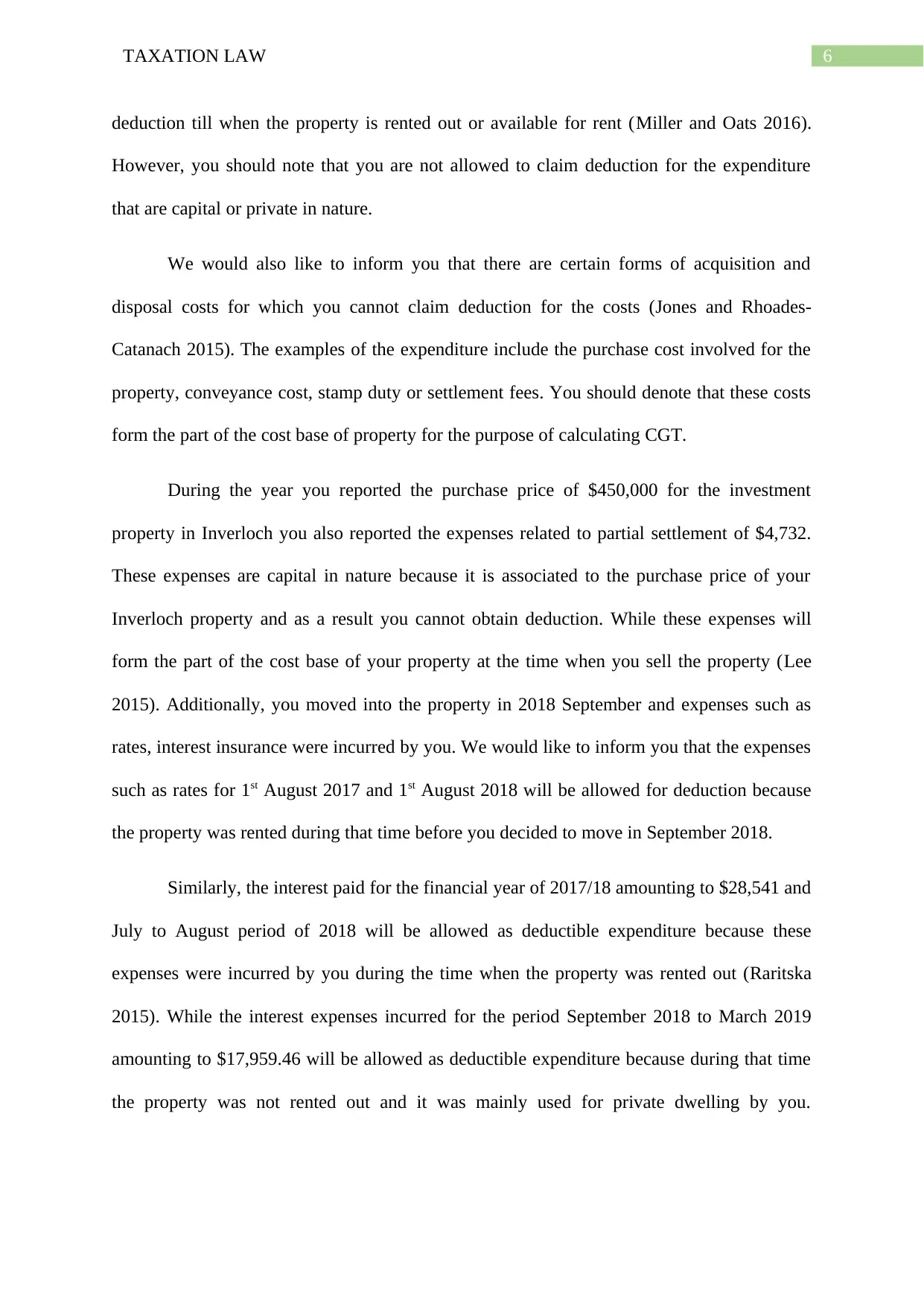
6TAXATION LAW
deduction till when the property is rented out or available for rent (Miller and Oats 2016).
However, you should note that you are not allowed to claim deduction for the expenditure
that are capital or private in nature.
We would also like to inform you that there are certain forms of acquisition and
disposal costs for which you cannot claim deduction for the costs (Jones and Rhoades-
Catanach 2015). The examples of the expenditure include the purchase cost involved for the
property, conveyance cost, stamp duty or settlement fees. You should denote that these costs
form the part of the cost base of property for the purpose of calculating CGT.
During the year you reported the purchase price of $450,000 for the investment
property in Inverloch you also reported the expenses related to partial settlement of $4,732.
These expenses are capital in nature because it is associated to the purchase price of your
Inverloch property and as a result you cannot obtain deduction. While these expenses will
form the part of the cost base of your property at the time when you sell the property (Lee
2015). Additionally, you moved into the property in 2018 September and expenses such as
rates, interest insurance were incurred by you. We would like to inform you that the expenses
such as rates for 1st August 2017 and 1st August 2018 will be allowed for deduction because
the property was rented during that time before you decided to move in September 2018.
Similarly, the interest paid for the financial year of 2017/18 amounting to $28,541 and
July to August period of 2018 will be allowed as deductible expenditure because these
expenses were incurred by you during the time when the property was rented out (Raritska
2015). While the interest expenses incurred for the period September 2018 to March 2019
amounting to $17,959.46 will be allowed as deductible expenditure because during that time
the property was not rented out and it was mainly used for private dwelling by you.
deduction till when the property is rented out or available for rent (Miller and Oats 2016).
However, you should note that you are not allowed to claim deduction for the expenditure
that are capital or private in nature.
We would also like to inform you that there are certain forms of acquisition and
disposal costs for which you cannot claim deduction for the costs (Jones and Rhoades-
Catanach 2015). The examples of the expenditure include the purchase cost involved for the
property, conveyance cost, stamp duty or settlement fees. You should denote that these costs
form the part of the cost base of property for the purpose of calculating CGT.
During the year you reported the purchase price of $450,000 for the investment
property in Inverloch you also reported the expenses related to partial settlement of $4,732.
These expenses are capital in nature because it is associated to the purchase price of your
Inverloch property and as a result you cannot obtain deduction. While these expenses will
form the part of the cost base of your property at the time when you sell the property (Lee
2015). Additionally, you moved into the property in 2018 September and expenses such as
rates, interest insurance were incurred by you. We would like to inform you that the expenses
such as rates for 1st August 2017 and 1st August 2018 will be allowed for deduction because
the property was rented during that time before you decided to move in September 2018.
Similarly, the interest paid for the financial year of 2017/18 amounting to $28,541 and
July to August period of 2018 will be allowed as deductible expenditure because these
expenses were incurred by you during the time when the property was rented out (Raritska
2015). While the interest expenses incurred for the period September 2018 to March 2019
amounting to $17,959.46 will be allowed as deductible expenditure because during that time
the property was not rented out and it was mainly used for private dwelling by you.
Paraphrase This Document
Need a fresh take? Get an instant paraphrase of this document with our AI Paraphraser
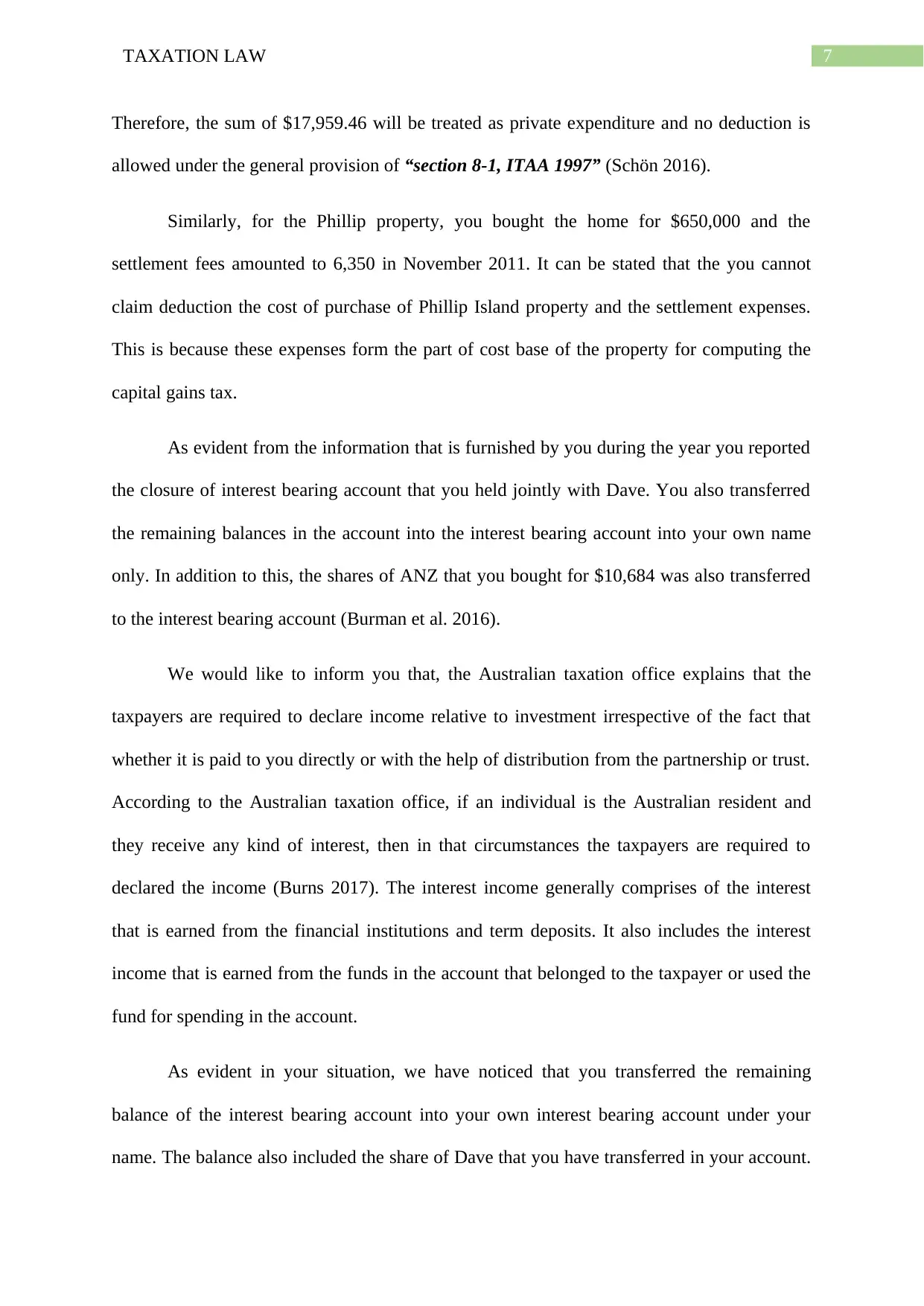
7TAXATION LAW
Therefore, the sum of $17,959.46 will be treated as private expenditure and no deduction is
allowed under the general provision of “section 8-1, ITAA 1997” (Schön 2016).
Similarly, for the Phillip property, you bought the home for $650,000 and the
settlement fees amounted to 6,350 in November 2011. It can be stated that the you cannot
claim deduction the cost of purchase of Phillip Island property and the settlement expenses.
This is because these expenses form the part of cost base of the property for computing the
capital gains tax.
As evident from the information that is furnished by you during the year you reported
the closure of interest bearing account that you held jointly with Dave. You also transferred
the remaining balances in the account into the interest bearing account into your own name
only. In addition to this, the shares of ANZ that you bought for $10,684 was also transferred
to the interest bearing account (Burman et al. 2016).
We would like to inform you that, the Australian taxation office explains that the
taxpayers are required to declare income relative to investment irrespective of the fact that
whether it is paid to you directly or with the help of distribution from the partnership or trust.
According to the Australian taxation office, if an individual is the Australian resident and
they receive any kind of interest, then in that circumstances the taxpayers are required to
declared the income (Burns 2017). The interest income generally comprises of the interest
that is earned from the financial institutions and term deposits. It also includes the interest
income that is earned from the funds in the account that belonged to the taxpayer or used the
fund for spending in the account.
As evident in your situation, we have noticed that you transferred the remaining
balance of the interest bearing account into your own interest bearing account under your
name. The balance also included the share of Dave that you have transferred in your account.
Therefore, the sum of $17,959.46 will be treated as private expenditure and no deduction is
allowed under the general provision of “section 8-1, ITAA 1997” (Schön 2016).
Similarly, for the Phillip property, you bought the home for $650,000 and the
settlement fees amounted to 6,350 in November 2011. It can be stated that the you cannot
claim deduction the cost of purchase of Phillip Island property and the settlement expenses.
This is because these expenses form the part of cost base of the property for computing the
capital gains tax.
As evident from the information that is furnished by you during the year you reported
the closure of interest bearing account that you held jointly with Dave. You also transferred
the remaining balances in the account into the interest bearing account into your own name
only. In addition to this, the shares of ANZ that you bought for $10,684 was also transferred
to the interest bearing account (Burman et al. 2016).
We would like to inform you that, the Australian taxation office explains that the
taxpayers are required to declare income relative to investment irrespective of the fact that
whether it is paid to you directly or with the help of distribution from the partnership or trust.
According to the Australian taxation office, if an individual is the Australian resident and
they receive any kind of interest, then in that circumstances the taxpayers are required to
declared the income (Burns 2017). The interest income generally comprises of the interest
that is earned from the financial institutions and term deposits. It also includes the interest
income that is earned from the funds in the account that belonged to the taxpayer or used the
fund for spending in the account.
As evident in your situation, we have noticed that you transferred the remaining
balance of the interest bearing account into your own interest bearing account under your
name. The balance also included the share of Dave that you have transferred in your account.
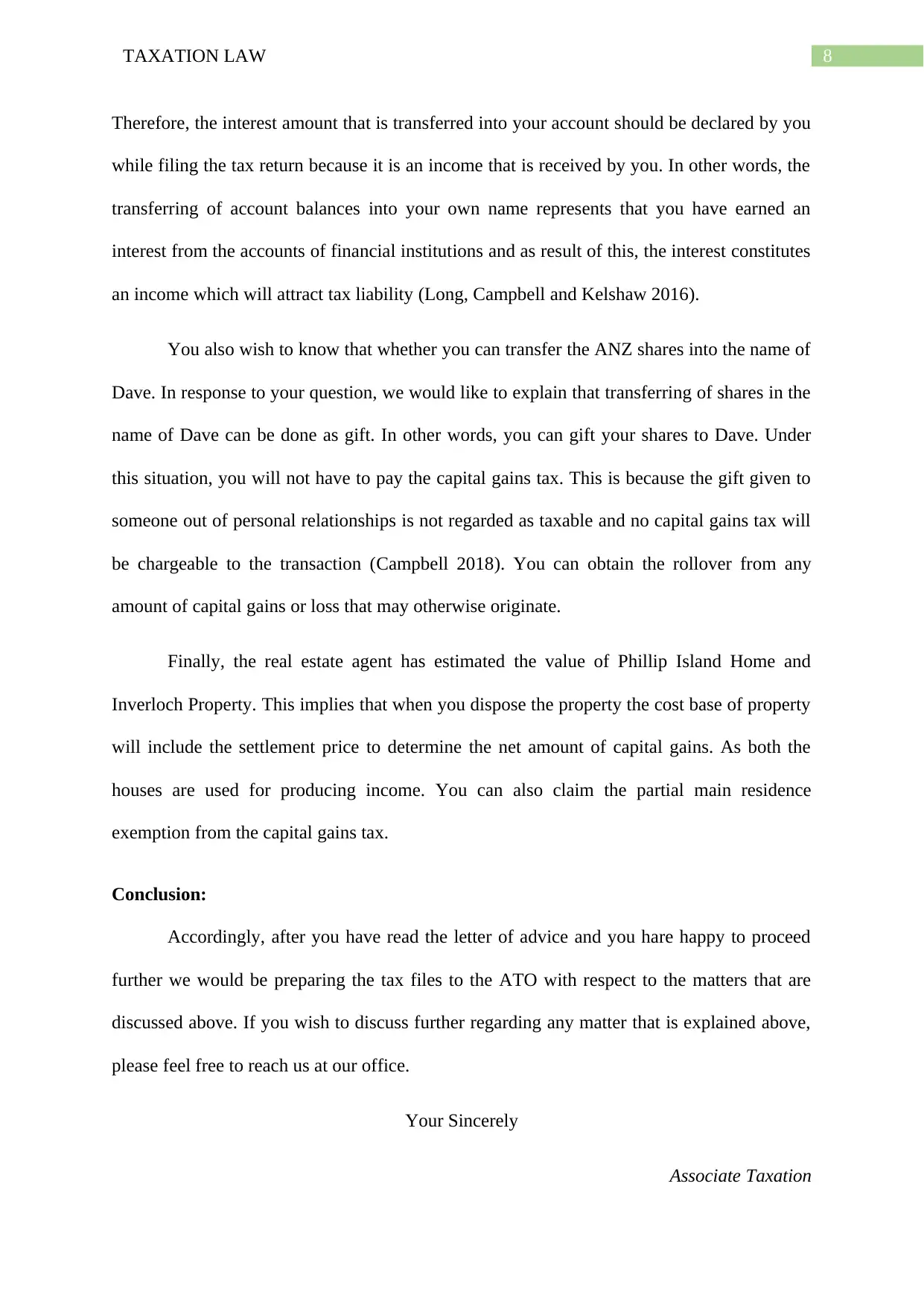
8TAXATION LAW
Therefore, the interest amount that is transferred into your account should be declared by you
while filing the tax return because it is an income that is received by you. In other words, the
transferring of account balances into your own name represents that you have earned an
interest from the accounts of financial institutions and as result of this, the interest constitutes
an income which will attract tax liability (Long, Campbell and Kelshaw 2016).
You also wish to know that whether you can transfer the ANZ shares into the name of
Dave. In response to your question, we would like to explain that transferring of shares in the
name of Dave can be done as gift. In other words, you can gift your shares to Dave. Under
this situation, you will not have to pay the capital gains tax. This is because the gift given to
someone out of personal relationships is not regarded as taxable and no capital gains tax will
be chargeable to the transaction (Campbell 2018). You can obtain the rollover from any
amount of capital gains or loss that may otherwise originate.
Finally, the real estate agent has estimated the value of Phillip Island Home and
Inverloch Property. This implies that when you dispose the property the cost base of property
will include the settlement price to determine the net amount of capital gains. As both the
houses are used for producing income. You can also claim the partial main residence
exemption from the capital gains tax.
Conclusion:
Accordingly, after you have read the letter of advice and you hare happy to proceed
further we would be preparing the tax files to the ATO with respect to the matters that are
discussed above. If you wish to discuss further regarding any matter that is explained above,
please feel free to reach us at our office.
Your Sincerely
Associate Taxation
Therefore, the interest amount that is transferred into your account should be declared by you
while filing the tax return because it is an income that is received by you. In other words, the
transferring of account balances into your own name represents that you have earned an
interest from the accounts of financial institutions and as result of this, the interest constitutes
an income which will attract tax liability (Long, Campbell and Kelshaw 2016).
You also wish to know that whether you can transfer the ANZ shares into the name of
Dave. In response to your question, we would like to explain that transferring of shares in the
name of Dave can be done as gift. In other words, you can gift your shares to Dave. Under
this situation, you will not have to pay the capital gains tax. This is because the gift given to
someone out of personal relationships is not regarded as taxable and no capital gains tax will
be chargeable to the transaction (Campbell 2018). You can obtain the rollover from any
amount of capital gains or loss that may otherwise originate.
Finally, the real estate agent has estimated the value of Phillip Island Home and
Inverloch Property. This implies that when you dispose the property the cost base of property
will include the settlement price to determine the net amount of capital gains. As both the
houses are used for producing income. You can also claim the partial main residence
exemption from the capital gains tax.
Conclusion:
Accordingly, after you have read the letter of advice and you hare happy to proceed
further we would be preparing the tax files to the ATO with respect to the matters that are
discussed above. If you wish to discuss further regarding any matter that is explained above,
please feel free to reach us at our office.
Your Sincerely
Associate Taxation
⊘ This is a preview!⊘
Do you want full access?
Subscribe today to unlock all pages.

Trusted by 1+ million students worldwide

9TAXATION LAW
Knight Consultancy Pty Ltd
Knight Consultancy Pty Ltd
Paraphrase This Document
Need a fresh take? Get an instant paraphrase of this document with our AI Paraphraser
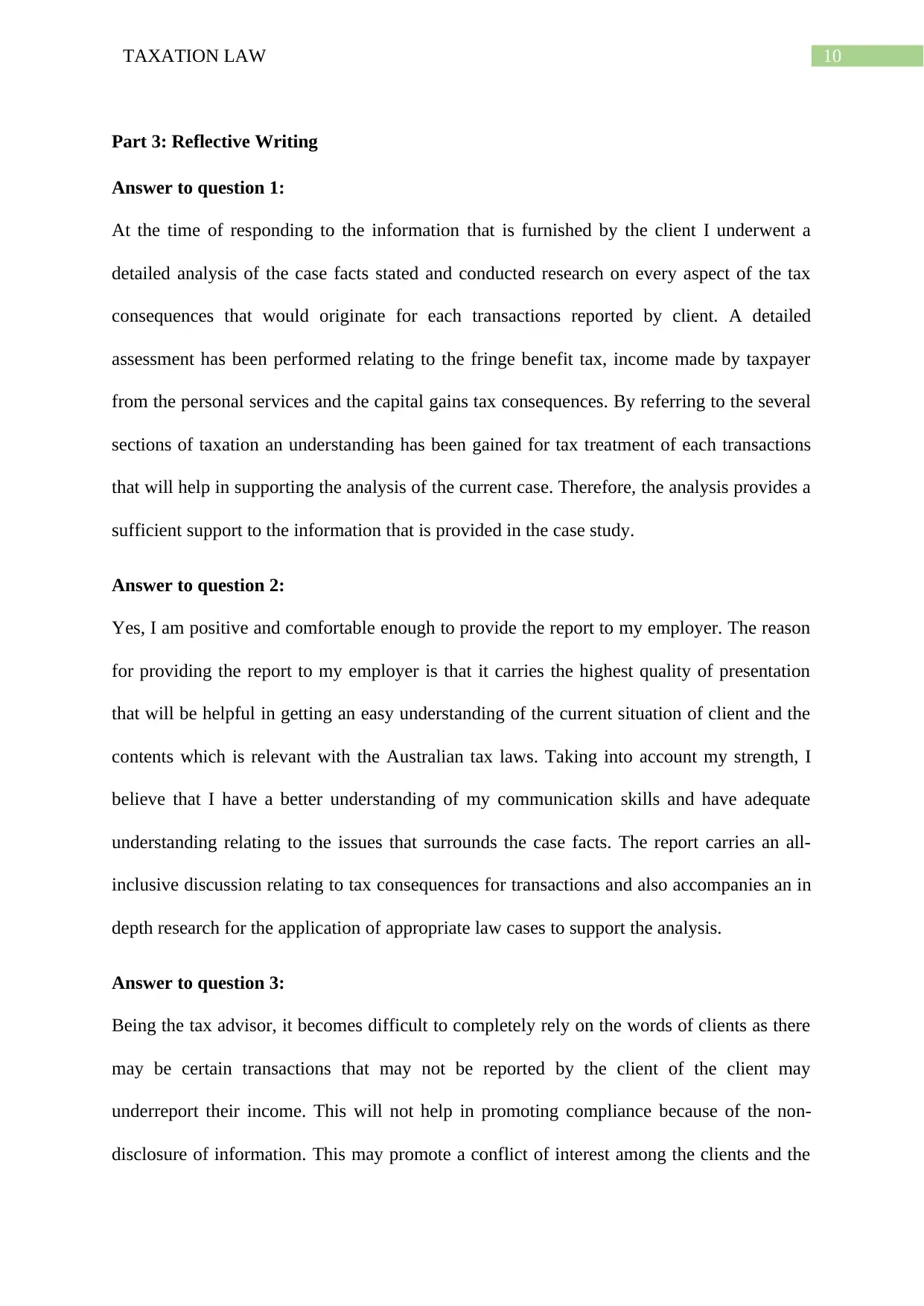
10TAXATION LAW
Part 3: Reflective Writing
Answer to question 1:
At the time of responding to the information that is furnished by the client I underwent a
detailed analysis of the case facts stated and conducted research on every aspect of the tax
consequences that would originate for each transactions reported by client. A detailed
assessment has been performed relating to the fringe benefit tax, income made by taxpayer
from the personal services and the capital gains tax consequences. By referring to the several
sections of taxation an understanding has been gained for tax treatment of each transactions
that will help in supporting the analysis of the current case. Therefore, the analysis provides a
sufficient support to the information that is provided in the case study.
Answer to question 2:
Yes, I am positive and comfortable enough to provide the report to my employer. The reason
for providing the report to my employer is that it carries the highest quality of presentation
that will be helpful in getting an easy understanding of the current situation of client and the
contents which is relevant with the Australian tax laws. Taking into account my strength, I
believe that I have a better understanding of my communication skills and have adequate
understanding relating to the issues that surrounds the case facts. The report carries an all-
inclusive discussion relating to tax consequences for transactions and also accompanies an in
depth research for the application of appropriate law cases to support the analysis.
Answer to question 3:
Being the tax advisor, it becomes difficult to completely rely on the words of clients as there
may be certain transactions that may not be reported by the client of the client may
underreport their income. This will not help in promoting compliance because of the non-
disclosure of information. This may promote a conflict of interest among the clients and the
Part 3: Reflective Writing
Answer to question 1:
At the time of responding to the information that is furnished by the client I underwent a
detailed analysis of the case facts stated and conducted research on every aspect of the tax
consequences that would originate for each transactions reported by client. A detailed
assessment has been performed relating to the fringe benefit tax, income made by taxpayer
from the personal services and the capital gains tax consequences. By referring to the several
sections of taxation an understanding has been gained for tax treatment of each transactions
that will help in supporting the analysis of the current case. Therefore, the analysis provides a
sufficient support to the information that is provided in the case study.
Answer to question 2:
Yes, I am positive and comfortable enough to provide the report to my employer. The reason
for providing the report to my employer is that it carries the highest quality of presentation
that will be helpful in getting an easy understanding of the current situation of client and the
contents which is relevant with the Australian tax laws. Taking into account my strength, I
believe that I have a better understanding of my communication skills and have adequate
understanding relating to the issues that surrounds the case facts. The report carries an all-
inclusive discussion relating to tax consequences for transactions and also accompanies an in
depth research for the application of appropriate law cases to support the analysis.
Answer to question 3:
Being the tax advisor, it becomes difficult to completely rely on the words of clients as there
may be certain transactions that may not be reported by the client of the client may
underreport their income. This will not help in promoting compliance because of the non-
disclosure of information. This may promote a conflict of interest among the clients and the
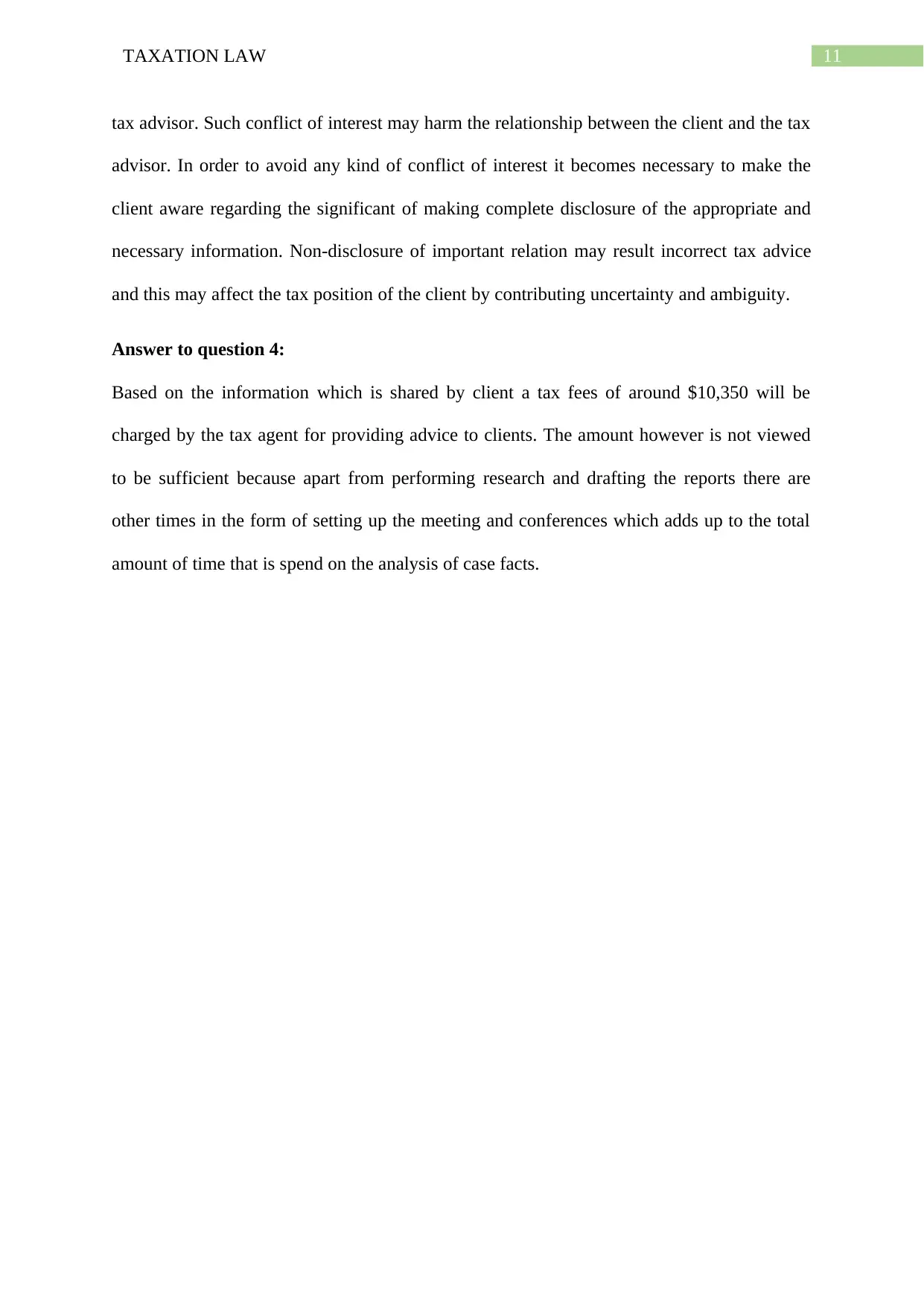
11TAXATION LAW
tax advisor. Such conflict of interest may harm the relationship between the client and the tax
advisor. In order to avoid any kind of conflict of interest it becomes necessary to make the
client aware regarding the significant of making complete disclosure of the appropriate and
necessary information. Non-disclosure of important relation may result incorrect tax advice
and this may affect the tax position of the client by contributing uncertainty and ambiguity.
Answer to question 4:
Based on the information which is shared by client a tax fees of around $10,350 will be
charged by the tax agent for providing advice to clients. The amount however is not viewed
to be sufficient because apart from performing research and drafting the reports there are
other times in the form of setting up the meeting and conferences which adds up to the total
amount of time that is spend on the analysis of case facts.
tax advisor. Such conflict of interest may harm the relationship between the client and the tax
advisor. In order to avoid any kind of conflict of interest it becomes necessary to make the
client aware regarding the significant of making complete disclosure of the appropriate and
necessary information. Non-disclosure of important relation may result incorrect tax advice
and this may affect the tax position of the client by contributing uncertainty and ambiguity.
Answer to question 4:
Based on the information which is shared by client a tax fees of around $10,350 will be
charged by the tax agent for providing advice to clients. The amount however is not viewed
to be sufficient because apart from performing research and drafting the reports there are
other times in the form of setting up the meeting and conferences which adds up to the total
amount of time that is spend on the analysis of case facts.
⊘ This is a preview!⊘
Do you want full access?
Subscribe today to unlock all pages.

Trusted by 1+ million students worldwide
1 out of 15
Related Documents
Your All-in-One AI-Powered Toolkit for Academic Success.
+13062052269
info@desklib.com
Available 24*7 on WhatsApp / Email
![[object Object]](/_next/static/media/star-bottom.7253800d.svg)
Unlock your academic potential
Copyright © 2020–2026 A2Z Services. All Rights Reserved. Developed and managed by ZUCOL.





